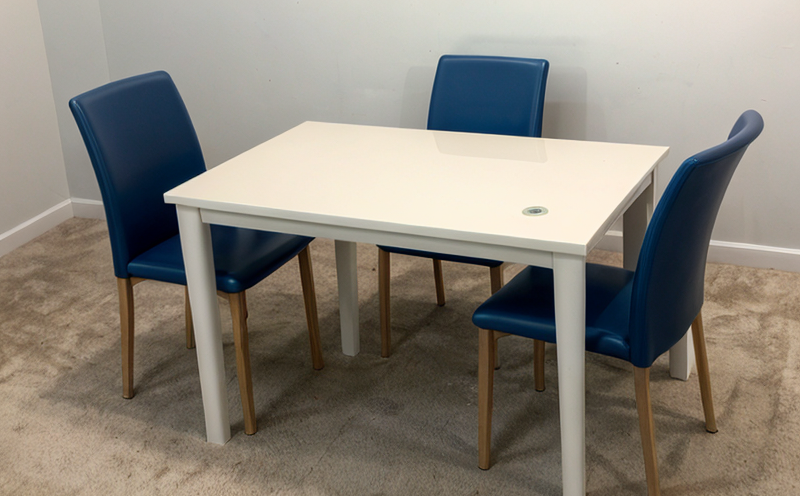NF EN 1730 Stability Testing of Furniture Plastics
The NF EN 1730 stability testing standard is a critical requirement in ensuring that furniture plastics meet durability and performance expectations under various environmental conditions. This test assesses the resistance of plastic materials used in furniture to long-term exposure, ensuring they do not degrade over time due to factors such as heat, light, moisture, or chemical agents.
This stability testing is particularly important for manufacturers who wish to guarantee their products' longevity and meet regulatory requirements set forth by international standards. The test subjects the plastic specimens to a series of controlled environmental conditions that simulate real-world exposure scenarios. Compliance with NF EN 1730 helps furniture companies maintain a competitive edge in both domestic and export markets.
The testing process is comprehensive, involving multiple stages designed to evaluate different aspects of material stability. These include accelerated aging tests under high-temperature environments, humidity cycling, and long-term sunlight exposure simulations. By adhering strictly to NF EN 1730 guidelines, manufacturers can ensure that their products maintain their aesthetic appeal and functionality throughout their expected lifecycle.
For furniture manufacturers, the NF EN 1730 test is a crucial quality assurance measure. It provides confidence in the durability of plastic materials used in furniture design, ensuring consistent performance across all end-use applications. Moreover, passing this test demonstrates commitment to high-quality manufacturing processes and compliance with international standards.
The test is particularly relevant for items like cushions, upholstery, armrests, and other components that come into direct contact with users or are exposed to environmental elements frequently. It ensures these parts remain resilient against wear and tear, thereby enhancing overall product reliability.
Compliance with NF EN 1730 also facilitates easier market access for furniture exporters by meeting international regulatory requirements. Many countries have adopted this standard as a benchmark for assessing the quality of imported goods. Therefore, achieving certification through this test can significantly reduce barriers to entry into these markets.
In summary, NF EN 1730 stability testing is an indispensable tool in the quality assurance process for furniture manufacturers. By subjecting plastics used in various parts of furniture to rigorous environmental stressors, it ensures that products not only meet aesthetic standards but also perform reliably over extended periods.
Why It Matters
The NF EN 1730 stability testing is essential for ensuring the longevity and reliability of furniture plastics. This type of testing helps manufacturers identify potential weaknesses in their product designs before they reach consumers, preventing costly recalls or warranty claims.
- Enhanced Durability: By simulating real-world conditions, NF EN 1730 tests help uncover any materials that may deteriorate over time. This allows for early intervention and improvement of those materials.
- Better Customer Satisfaction: Products that pass this test are more likely to retain their appearance and functionality longer, leading to higher customer satisfaction rates.
- Competitive Advantage: Compliance with international standards like NF EN 1730 can set a brand apart from competitors by signaling commitment to quality.
In addition to these benefits, compliance also helps streamline the production process. It allows manufacturers to identify and rectify issues at an early stage, reducing rework costs and speeding up time-to-market for new products.
For procurement teams, knowing that their suppliers meet such stringent quality controls reassures them about receiving consistently high-quality materials. Ultimately, this contributes to more robust supply chains capable of delivering reliable goods globally.
Benefits
- Improved Product Quality: NF EN 1730 stability testing ensures that the plastic components used in furniture undergo rigorous evaluation, leading to superior product quality.
- Cost Savings: Early detection of material issues through thorough testing can prevent significant expenses associated with post-sale service and warranty claims.
- Increased Market Access: Meeting international standards enhances the chances of successfully entering new markets or expanding existing ones.
- Better Customer Retention: Products that are durable and reliable tend to retain customers longer, fostering brand loyalty and positive word-of-mouth recommendations.
Furthermore, successful completion of NF EN 1730 testing can lead to enhanced customer trust in the brand. This increased confidence translates into stronger market positions and better long-term business prospects for furniture manufacturers.
International Acceptance and Recognition
The NF EN 1730 standard has gained widespread acceptance across Europe and other regions, reflecting its importance in ensuring consistent quality standards. Many countries recognize this as a reliable measure of material durability, making it easier for manufacturers to comply with local regulations.
- European Union: As part of the European Union's harmonized technical specifications, NF EN 1730 is widely accepted within EU member states.
- Beyond Europe: The standard has been adopted by several countries outside Europe, including Australia and New Zealand, where it serves as a benchmark for assessing imported goods' quality.
The international recognition of NF EN 1730 underscores its value in facilitating global trade. By adhering to this standard, manufacturers can ensure their products meet the highest possible standards, thereby enhancing their competitiveness on both domestic and export markets.





